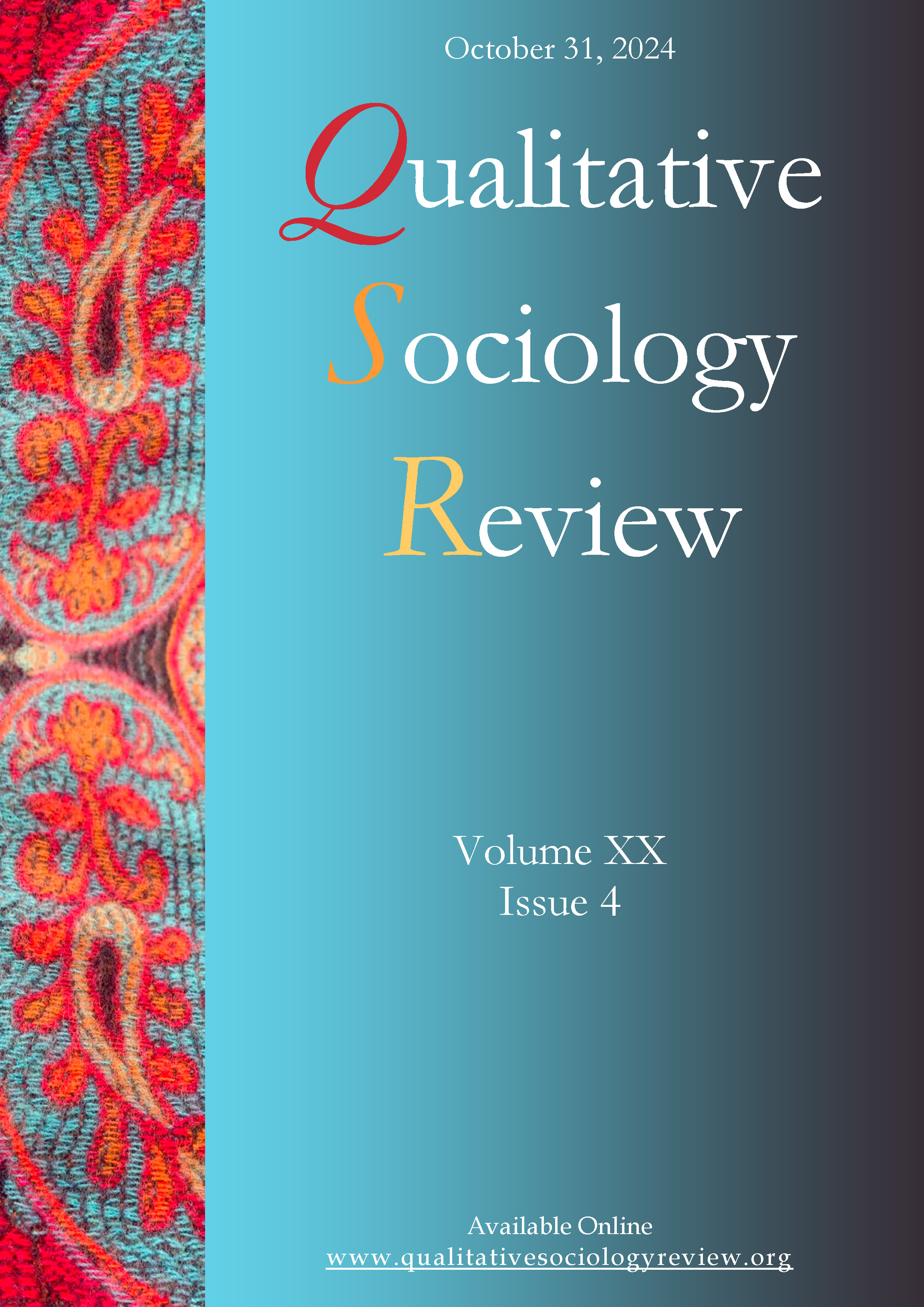Game-Based Technique for Studying Identity Change in Disturbed Communities
DOI:
https://doi.org/10.18778/1733-8077.20.4.03Keywords:
Authoritarian Regimes, Ethical Considerations, Game-Based Research, Identity Transformation, Projective Techniques, Sensitive TopicsAbstract
Studying social identity change in non-standard contexts is always challenging. This article presents a new research technique that allows researchers to obtain rich and ethical data even in adverse and fragile conditions. It is based on the popular associative card game and combines projective and game-based data generation methods. The game component adds a playful atmosphere to the research environment and encourages interaction, while the projective aspect allows participants to express identity elements more easily. The features of the new technique presented in this paper are demonstrated through a case study of the post-2020 Belarusian diaspora. In addition to data generation, I describe a coding process that blends deductive and inductive approaches and show how textual and visual data can be analyzed together. Finally, the advantages and disadvantages of this innovative technique are assessed, including creative expression, a safe space for dialogue, and the ability to capture nuanced perspectives.
Downloads
References
Askins, Kye and Rachel Pain. 2011. “Contact Zones: Participation, Materiality, and the Messiness of Interaction.” Environment and Planning D: Society and Space 29(5):803-821.
Google Scholar
DOI: https://doi.org/10.1068/d11109
Astapova, Anastasiya. 2017. “Rumor, Humor, and Other Forms of Election Folklore in Non-Democratic Societies: The Case of Belarus.” Folklore: Electronic Journal of Folklore 69:15-48.
Google Scholar
DOI: https://doi.org/10.7592/FEJF2017.69.astapova
Bailey, Peter, Graeme Pritchard, and Hugh Kernohan. 2015. “Gamification in Market Research.” International Journal of Market Research 57(1):17-28.
Google Scholar
DOI: https://doi.org/10.2501/IJMR-2015-003
Barker, David. 1979. “Appropriate Methodology: An Example Using a Traditional African Board Game to Measure Farmers’ Attitudes and Environmental Images.” The IDS Bulletin 10(2):37-40.
Google Scholar
DOI: https://doi.org/10.1111/j.1759-5436.1979.mp10002006.x
Blumer, Herbert. 1986. Symbolic Interactionism. Berkeley, CA: University of California Press.
Google Scholar
Branthwaite, Alan. 2002. “Investigating the Power of Imagery in Marketing Communication: Evidence‐Based Techniques.” Qualitative Market Research: An International Journal 5(3):164-171.
Google Scholar
DOI: https://doi.org/10.1108/13522750210432977
Coemans, Sara and Karin Hannes. 2017. “Researchers Under the Spell of the Arts: Two Decades of Using Arts-Based Methods in Community-Based Inquiry with Vulnerable Populations.” Educational Research Review 22:34-49.
Google Scholar
DOI: https://doi.org/10.1016/j.edurev.2017.08.003
CohenMiller, Anna. 2018. “Creating a Participatory Arts-Based Online Focus Group: Highlighting the Transition from DocMama to Motherscholar.” The Qualitative Report 23(7): Article 17.
Google Scholar
DOI: https://doi.org/10.46743/2160-3715/2018.2895
Dunn, Victoria and Tom Mellor. 2017. “Creative, Participatory Projects with Young People: Reflections over Five Years.” Research for All 1(2):284-299.
Google Scholar
DOI: https://doi.org/10.18546/RFA.01.2.05
Fereday, Jennifer and Eimear Muir-Cochrane. 2006. “Demonstrating Rigor Using Thematic Analysis: A Hybrid Approach of Inductive and Deductive Coding and Theme Development.” International Journal of Qualitative Methods 5(1):80-92.
Google Scholar
DOI: https://doi.org/10.1177/160940690600500107
Glasius, Marlies et al. 2018. Research, Ethics, and Risk in the Authoritarian Field. Cham: Palgrave Macmillan.
Google Scholar
DOI: https://doi.org/10.1007/978-3-319-68966-1
Harper, Douglas. 2002. “Talking about Pictures: A Case for Photo Elicitation.” Visual Studies 17(1):13-26.
Google Scholar
DOI: https://doi.org/10.1080/14725860220137345
Hájek, Martin et al. 2019. “Uneasy Neoliberal Governance in Low-Trust Society: Barriers to Responsibilisation in the Czech Republic.” Sociological Research Online 25(2):201-218.
Google Scholar
DOI: https://doi.org/10.1177/1360780419866464
Janenova, Saltanat. 2019. “The Boundaries of Research in an Authoritarian State.” International Journal of Qualitative Methods. doi: https://doi.org/10.1177/1609406919876469
Google Scholar
DOI: https://doi.org/10.1177/1609406919876469
Koch, Natalie. 2013. “Introduction—Field Methods in ‘Closed Contexts’: Undertaking Research in Authoritarian States and Places.” Area 45(4):390-395.
Google Scholar
DOI: https://doi.org/10.1111/area.12044
Lee, Raymond M. 1993. Doing Research on Sensitive Topics. London: Sage.
Google Scholar
Martin, Roger and Yolande Strengers. 2022. “Playing Games with the Weather: A Card Game Method for Engaging Households in Conversations about Renewable Energy Generation and Everyday Practice.” Geographical Research 60(4):575-588.
Google Scholar
DOI: https://doi.org/10.1111/1745-5871.12547
Morgenbesser, Lee and Meredith L. Weiss. 2018. “Survive and Thrive: Field Research in Authoritarian Southeast Asia.” Asian Studies Review 42(3):385-403.
Google Scholar
DOI: https://doi.org/10.1080/10357823.2018.1472210
Parker, Lee D. 2009. “Photo‐Elicitation: An Ethno‐Historical Accounting and Management Research Prospect.” Accounting, Auditing and Accountability Journal 22(7):1111-1129.
Google Scholar
DOI: https://doi.org/10.1108/09513570910987439
Porr, Caroline et al. 2011. “The Evocative Power of Projective Techniques for the Elicitation of Meaning.” International Journal of Qualitative Methods 10(1):30-41.
Google Scholar
DOI: https://doi.org/10.1177/160940691101000103
Rohava, Maryia. 2018. “Identity in an Autocratic State. Or What Belarusians Talk about When They Talk about National Identity.” East European Politics and Societies 32(3). doi: https://doi.org/10.1177/0888325417741343
Google Scholar
DOI: https://doi.org/10.1177/0888325417741343
Rowley, Jennifer et al. 2012. “Using Card-Based Games to Enhance the Value of Semi-Structured Interviews.” International Journal of Market Research 54(1):93-110.
Google Scholar
DOI: https://doi.org/10.2501/IJMR-54-1-093-110
Rudnik, Lesia. 2021. “Naskol’ko bezopasno osusaut seba belarusy za granicej? – Centr novyh idej [How Safe Do Belarusians Feel Abroad? Center for New Ideas].” Retrieved August 25, 2023 https://newbelarus.vision/belarusians-safety-abroad/
Google Scholar
Smith, Laura G. E., Emma F. Thomas, and Craig McGarty. 2014. “‘We Must Be the Change We Want to See in the World’: Integrating Norms and Identities through Social Interaction.” Political Psychology 36(5):543-557.
Google Scholar
DOI: https://doi.org/10.1111/pops.12180
Smithson, Janet. 2000. “Using and Analysing Focus Groups: Limitations and Possibilities.” International Journal of Social Research Methodology 3(2):103-119.
Google Scholar
DOI: https://doi.org/10.1080/136455700405172
Vila, Pablo. 2013. “The Importance of Photo-Interviewing as a Research Method in the Study of Identity Construction Processes: An Illustration from the U.S.–Mexico Border.” Visual Anthropology 26(1):51-68.
Google Scholar
DOI: https://doi.org/10.1080/08949468.2013.735187
Downloads
Published
How to Cite
Issue
Section
License

This work is licensed under a Creative Commons Attribution-NonCommercial-NoDerivatives 4.0 International License.











